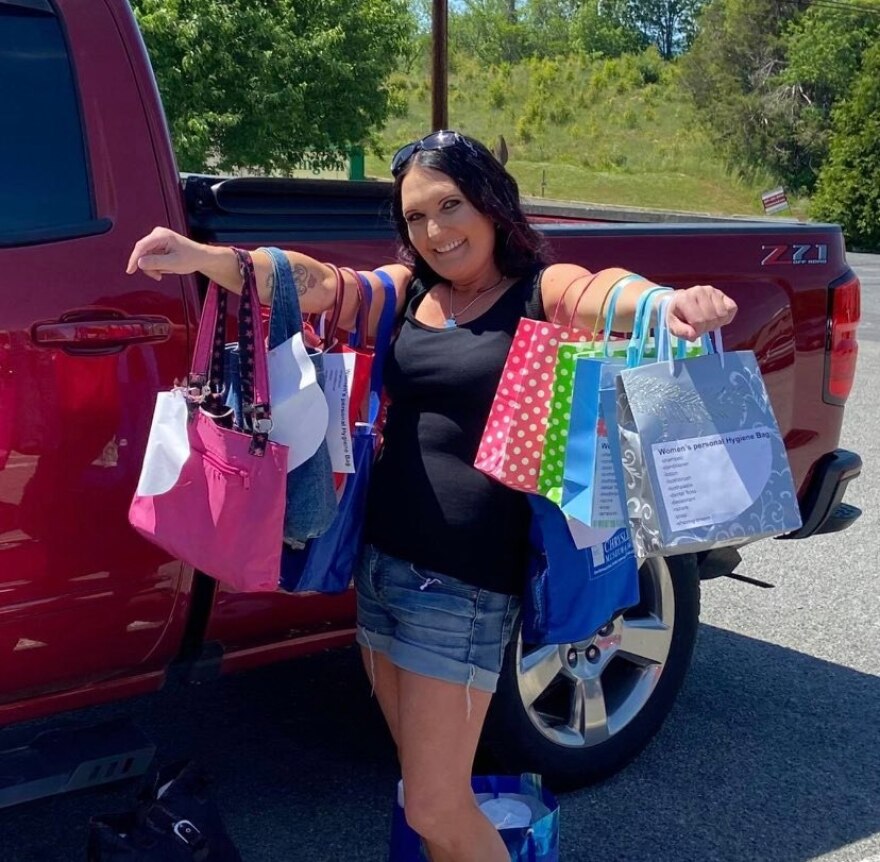As inflation soars and many people still struggle financially post-pandemic, a national movement in which goods and services are exchanged for free is growing. WMRA’s Jessie Knadler takes a look at the Buy Nothing movement taking hold in Lexington.
[sounds of The Free Market]

There is a store in Lexington that is unlike all others. You go in, you browse, you look through clothes, baby supplies, books, some furniture, you take what you need. You leave. What you don’t do here is pay any money for what you’re taking.
TONIA CLEMMER: Thanks y’all!
That’s right. Shopping at this store is free. As in, really free. As in, really REALLY free. In fact, that’s what it’s called. The Really Really Free Market. It’s kind of like a Goodwill or Salvation Army only with less merchandising props such as clothing racks and shelving. The floor is overflowing with donations. And shoppers.
CRYSTAL MULLER: When you’re struggling and you need hygiene products or any of that, you can come here and get it for free and that’s great. It helps a whole lot.
Crystal Muller was at the Free Market with her mother and two babies. They were there specifically for the Care Kits, a bimonthly program run through the Free Market where people can come in and pick up bags of personal hygiene and home essential items, and baby products. For free.
CLEMMER: It’s a program that’s used to lighten the load. So you can take that money that you would have spent on those things that are necessities and put it toward your light bill or your rent or any other thing you need.
Tonia Clemmer started the Care Kits program out of her guest bedroom before moving it to the Free Market. She understood firsthand the need for such a service.

CLEMMER: I’ve been a single mom for 19 years. I have a special needs son and it’s hard. Even before Covid things are tough. Right now, with prices rising so rapidly and the holidays approaching, I just felt like there’s a need.
She figured people dealing with food insecurity can go to the Food Bank. But there were no social services she knew of that addressed other necessities like shampoo. And she didn’t want her customers to feel bad or guilty for needing these things.
CLEMMER: We joke. We cut up. We have pretty gift bags. And you leave here like you were in a downtown shop.

NANCI OULD: I’ve lived in this community my whole life, and I just want to say to our community, they are awesome. Because all Tonia has to put out is a need for something and there is somebody somewhere that if they can’t donate it, they’ll send in a monetary donation. It’s just amazing, this program.
Nanci Ould is a Care Kits volunteer. She was also Care Kits customer. She says being involved with the program, working with Tonia, giving back to the community, has literally changed her life.
OULD: I suffer from depression. And anxiety. And it has given me a reason not to crawl up in my bed and just go to sleep and pretend like the world is not here. It's given me a purpose.
Care Kits, the Really, Really Free Market—it’s all part of a growing national movement known as the Buy Nothing Project. Buy Nothing is a network of social media groups that encourages people to give and receive goods and services without any money changing hands. For a lot of people, it represents a mindset shift. The idea that you don’t always have to buy and sell things in a society already overflowing with stuff. Sometimes it just feels better to give it away.
Amenie Mitchell helped spearhead the movement in Rockbridge County. She’s a single mom, an environmentalist. She owned a popular restaurant in Lexington, and now she cares for her ailing father.

AMENIE MITCHELL: Yes, money is a resource and is a form of abundance, but it is by no means the only one and your skills, your experiences, the things that you have, the material possessions you have. I mean, even just your time are all resources.
Amenie also launched The Zipper Collective. It’s an incubator for other mutual aid ideas people like Tonia may want to develop. In fact, Tonia is expanding her program to help people, particularly victims of domestic abuse, furnish their homes. Here’s Amenie again.
MITCHELL: Money to me is not as important a currency as human connection is. The fulfillment that I get from what I'm doing right now is so soul deep, that nothing else could come close. But it's scary because everything we're taught how we measure one another, how we define power is all about currency and money. And it's scary to go, you know what? That's not my currency.
Still, Amenie acknowledges that, yes, the lights at The Market have to stay on and that takes money—generous donations from community members who, so far, have been more than willing to support these projects. The Facebook group Buy Nothing Lexington VA has nearly 4,000 members. In a town of 8,000, that says something.

